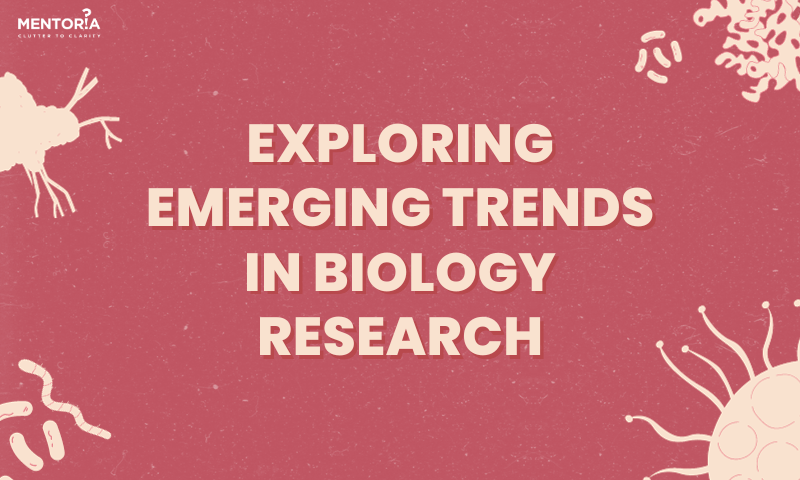Exploring Emerging Trends In Biology Research

Molecular biology can be compared to a detective game, where scientists take on the role of Sherlock Holmes, in the realm. They unravel the codes that govern lifes workings. However just when you think you’ve unravelled it all a whole new wave of mysteries and patterns arises. The field of biology is abuzz with groundbreaking advancements in single cell analysis providing insights into the complexities of individual cells. This revolution is transforming the landscape of engineering. Brace yourself for a journey through the emerging trends in molecular biology research that promises to be an awe inspiring adventure.
Latest Trends
Single-Cell Analysis
The analysis of cells, known as single cell analysis has emerged as a groundbreaking technique, in research. It enables scientists to delve into the workings of cells and gain insights into the development of diseases.
In the realm of cancer research single cell analysis holds promise. Researchers are utilising this technique to identify types of cancer cells within tumours and create targeted therapies that specifically address these cell populations.
Furthermore single cell analysis is proving invaluable in exploring conditions like autoimmune disorders and neurological ailments. By comprehending the functioning of cells scientists can pave the way for novel treatments, for these diseases.
Gene Editing
Gene editing stands as a potent technology facilitating precise alterations to DNA, holding the potential to revolutionise diverse fields, including medicine and agriculture. In 2021, the U.S. gene editing market was valued at USD 2.90 billion, with projections indicating growth to USD 9.16 billion by 2027, boasting a remarkable CAGR of 21.13%.
Within the domain of gene editing, one of its most auspicious applications lies in the realm of genetic disease treatment. Researchers are harnessing gene editing techniques to pioneer innovative therapies for afflictions like sickle cell anaemia, cystic fibrosis, and cancer.
Furthermore, gene editing is proving instrumental in enhancing agricultural practices. Notably, scientists are employing gene editing to engineer crops that exhibit resilience against pests and diseases, as well as livestock with augmented meat or milk production capabilities.
Metagenomics: Unveiling Microbial Mysteries
Hidden inside our bodies and the environment are microbial communities so vast that we’re only beginning to scratch the surface. Metagenomics involves sequencing DNA from entire ecosystems, allowing us to understand the roles these microbes play in health, disease, and environmental processes. It’s like exploring an uncharted microbial universe. The global metagenomics market size reached USD 452.9 Million in 2021.
In healthcare, metagenomics is transforming our understanding of the human microbiome—the community of microorganisms living in and on our bodies. Researchers are discovering how these microbes influence digestion, immunity, and even mental health. This knowledge could lead to novel treatments for various conditions.
Synthetic Biology
Synthetic biology is this fascinating field where scientists apply engineering principles to biology, essentially designing and constructing new biological systems. It’s like the creative fusion of biology and engineering, opening up a world of possibilities.
One of the most exciting aspects of synthetic biology is its potential in the realm of bioenergy. Researchers are working on designing organisms that can produce biofuels much more efficiently, which could be a game-changer for sustainable energy solutions.
But it doesn’t stop there. Synthetic biology also has a significant role in medicine. Scientists are harnessing its power to develop new drugs and vaccines, like the innovative Ebola vaccine. It’s remarkable how this field is reshaping not only biology but also our hopes for a brighter, more sustainable future.
Crispr-Cas9
CRISPR-Cas9 is a gene editing technology that is revolutionising molecular biology research. CRISPR-Cas9 is a simple, efficient, and affordable way to make precise changes to DNA. CRISPR-Cas9 is being used to study a wide range of biological questions. For example, CRISPR-Cas9 is being used to identify the genes that are involved in diseases such as cancer and Alzheimer’s disease. Moreover, CRISPR-Cas9 is not just a research tool; it’s a potential lifesaver. Since 2008, nearly 8,000 CRISPR-related papers have been published, the majority of which have been released since 2017.
Scientists are harnessing the power of CRISPR technology to develop treatments for genetic disorders such as sickle cell anaemia and cystic fibrosis. Picture a world where genetic ailments are no longer a grim life sentence but rather a manageable condition. This versatile technology is in a constant state of evolution, holding the potential for thrilling breakthroughs. It offers a glimpse into a future where genetic diseases are relegated to the annals of history.
Next-Generation Sequencing
Next-generation sequencing is a technology that allows scientists to sequence DNA quickly and cheaply. This technology has revolutionised molecular biology research.
Next-generation sequencing is being used to study a wide range of biological questions. For example, next-generation sequencing is being used to identify the genes that are involved in diseases such as cancer and autism.
Next-generation sequencing is also being used to develop new treatments for diseases. For example, scientists are using next-generation sequencing to develop new cancer therapies.
Stem Cells And Organoids: Growing Mini Organs
Have you ever imagined a scenario where we could create miniature versions of organs in the lab, each replicating the intricate functions of their full-sized counterparts? Well, thanks to the marvels of stem cell technology, that imagination is becoming a reality. Scientists are now harnessing the power of stem cells to cultivate what are known as “organoids.”
Scientists are cultivating organoids—tiny, functional organ models—for research and drug testing. These mini-organs provide a platform to study diseases and test potential treatments without invasive procedures. Furthermore, organoids have the potential to personalise medicine. By using a patient’s own stem cells to create organoids, researchers can study disease mechanisms and test drug responses specific to that individual. According to Precedence Research, the global stem cells market was estimated at USD 9.3 billion in 2020 and predicted to hit over USD 17.79 billion by 2027
Optogenetics: Controlling Cells With Light
Optogenetics is like having a remote control for cells. Scientists insert light-sensitive proteins into cells, enabling them to control cellular activity with precise bursts of light. One of the most exciting applications of optogenetics is in the field of neuroscience. Neuroscientists can insert these light-sensitive proteins into neurons, allowing them to precisely control neural activity with bursts of light. This level of control is a game-changer for understanding the brain’s complex functions and unravelling the mysteries of conditions like Parkinson’s disease, epilepsy, and depression.
But optogenetics isn’t limited to neuroscience. It has applications in various fields, from cardiac research to the study of muscle contractions. Researchers are exploring its potential for targeted cancer therapies, diabetes management, and even restoring vision to the blind.
Stay Ahead With Mentoria’s Mentorship
As we journey through the exciting landscape of molecular biology research, it’s evident that the field is in a constant state of evolution. However, staying at the forefront of these emerging trends and harnessing their power for your research can be a daunting task. That’s where Mentoria steps in as your trusted ally. Our platform connects you with mentors who are pioneers in the field, providing personalised guidance and insights to help you navigate these cutting-edge advancements. Whether you’re a budding researcher or an experienced scientist, Mentoria is here to ensure you’re always on the pulse of the latest breakthroughs.









